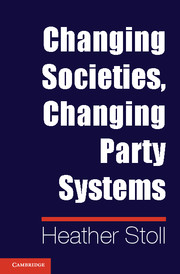Book contents
- Frontmatter
- Contents
- List of Tables
- List of Figures
- Acknowledgments
- 1 Introduction
- 2 Social Heterogeneity and the Number of Parties: A Theory
- 3 Describing Social Heterogeneity: Measures and Testable Hypotheses
- 4 Social Heterogeneity and Party System Fragmentation: Empirical Evidence across Space and Time
- 5 Israel: New Parties for New Groups?
- 6 Israel: Testing Hypotheses about Sectarian Party Success
- 7 The United States: New Parties for New Groups? Testing Hypotheses
- 8 Conclusion: Party System Fragmentation and Beyond
- A Additional Material for the Quantitative Analyses in Chapter 4
- B Demography in Israel
- C Sephardi and Russian Sectarian Parties and Their Success in Israel
- D Demography and the Franchise in the United States
- E African American Descriptive Representation in the United States
- Bibliography
- Index
6 - Israel: Testing Hypotheses about Sectarian Party Success
Published online by Cambridge University Press: 05 June 2014
- Frontmatter
- Contents
- List of Tables
- List of Figures
- Acknowledgments
- 1 Introduction
- 2 Social Heterogeneity and the Number of Parties: A Theory
- 3 Describing Social Heterogeneity: Measures and Testable Hypotheses
- 4 Social Heterogeneity and Party System Fragmentation: Empirical Evidence across Space and Time
- 5 Israel: New Parties for New Groups?
- 6 Israel: Testing Hypotheses about Sectarian Party Success
- 7 The United States: New Parties for New Groups? Testing Hypotheses
- 8 Conclusion: Party System Fragmentation and Beyond
- A Additional Material for the Quantitative Analyses in Chapter 4
- B Demography in Israel
- C Sephardi and Russian Sectarian Parties and Their Success in Israel
- D Demography and the Franchise in the United States
- E African American Descriptive Representation in the United States
- Bibliography
- Index
Summary
The last chapter closed with several puzzles. For one, what can explain the different political trajectories of Sephardi and Russian immigrants in Israel? Specifically, why have the Russians been more successful at forming sectarian political parties than the Sephardim have been? For another, what can explain the specific timing of the success of these new, latent social groups' sectarian parties? At a more general level, then, the puzzle is why increases in social heterogeneity have only sometimes increased party system fragmentation in Israel, despite its extremely permissive electoral system.
From the perspective of the existing literature, the failure of some of the new social groups added to Israeli society by immigration to obtain sectarian representation makes Israel a “deviant case” in need of explanation (Lijphart 1971, 692–693; see also Rogowski 2004, 77–83). A within-case analysis of such a case provides an “opportunity to discover the processes that caused the case to diverge from the hypothesized outcome” (Munck 2004, 118). Hence, another reason for conducting a case study of Israel is to fine-tune the argument. By holding constant the political institution upon which the existing literature has focused, the electoral system, I can explore how other factors matter.
These other factors are the focus of this chapter. Using the variation in sectarian party success across both immigrant groups and time in Israel uncovered in the last chapter, I test the theory I developed in Chapter 2 about how factors other than the electoral system shape the likelihood of sectarian party success, the primary mechanism by which social heterogeneity affects party system fragmentation.
- Type
- Chapter
- Information
- Changing Societies, Changing Party Systems , pp. 161 - 197Publisher: Cambridge University PressPrint publication year: 2013

